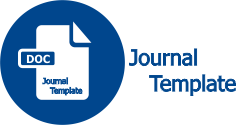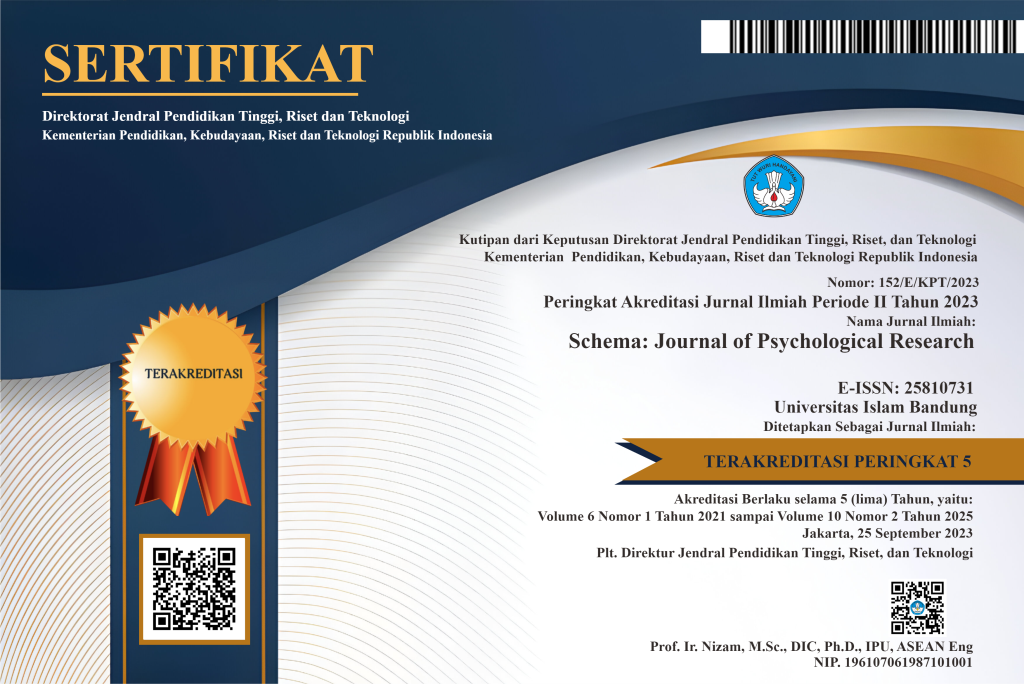Hubungan Hardiness dengan Stres Akademik (Studi Pada Mahasiswa Kedokteran Universitas X Program Studi Profesi Dokter (PSPD) di Kota Bandung)
Abstract
Selama menjalankan Program Studi Profesi Dokter (PSPD) di Universitas X, mahasiswa menerima berbagai macam stimulus berupa situasi akademik yang dapat menimbulkan stres. Terdapat mahasiswa menilai bahwa situasi akademik yang diterima merupakan suatu bencana atau hambatan dalam mencapai tujuan. Sedangkan beberapa mahasiswa lainnya menilai bahwa situasi akademik yang diterima merupakan kesempatan untuk menjadi dokter yang lebih berkompeten. Penilaian individu terhadap situasi akademik sebagai sebuah tantangan, kemampuannya dalam mengendalikan emosi, serta keterlibatan mahasiswa inilah yang nantinya membentuk karakteristik hardiness dalam diri mahasiswa. Penelitian ini bertujuan untuk mengetahui seberapa erat hubungan antara hardiness dengan stres akademik. Metode yang digunakan adalah kuantitatif korelasional dengan 71 Mahasiswa Program Studi Profesi Dokter (PSPD) di Universitas X sebagai sampel. Alat ukur yang digunakan adalah Revised Academic Hardiness Scale (RAHS) yang diadaptasi oleh Benishek (2001) dan stres akademik dari Gadzella (1991). Hasil penelitian menunjukkan koefisien korelasi antara hardiness dengan stres akademik adalah -0.504 dan koefisien signifikansi sebesar 0.000. Hal ini menunjukan bahwa terdapat hubungan yang cukup kuat, signifikan, dan negatif antara hardiness dengan stres akademik.
Keywords
Full Text:
PDFReferences
Benishek, L., & Lopez, F. (2001). Development and Initial Validation of a Measure of Academic Hardiness. Journal of Career Assessment - J CAREER ASSESSMENT, 9, 333-352. https://doi.org/10.1177/106907270100900402.
Benishek, L., Feldman, J., Shipon, R., Stacy., & Lopez, F. (2005). Development and Evaluation of the Revised Academic Hardiness Scale. Journal of Career Assessment - J CAREER ASSESSMENT, 13, 59-76. https://doi.org/10.1177/1069072704270274.
Bedewy, D., & Gabriel, A. (2015). Examining perceptions of academic stress and its sources among university students: The Perception of Academic Stress Scale. Health Psychology Open.
Dennis, K. S. (2000). Faculty Behavior and Other Key Factors in Student Adjustment to Medical School. Advances in Health Sciences Education, 5(1), 55–69. https://doi.org/10.1023/a:1009881817227.
Dickstein, L., & Elkes, J. (1987). Health awareness and the medical student: A preliminary experiment. Advances, 4, 11–23.
Florian, V., Mikulincer, M., & Taubman, O. (1995). Does hardiness contribute to mental health during a stressful real-life situation? The roles of appraisal and coping. Journal of Personality and Social Psychology, 68(4), 687-695.
Gadzella, B. M. (1991). Student-life Stress Inventory. Commerce, TX: Copyright.
Gadzella, B. M. (1994). Student-Life Stress Inventory: Identification of and reactions to stressors. Psychological Reports, 74(2), 395-402.
Gadzella, B. M., & Masten, W. G. (2005). An Analysis Of The Categories In The Student-Life Stres Inventory. American Journal of Psychological Reports, 1(1), 1- 10.
Gadzella, B., Baloğlu, M., Masten, W., & Wang, Q. (2012). Evaluation of the Student Life-stress Inventory-Revised.
Lazarus, R. S. (1999). Stress and emotion: A new synthesis. New York, US: Springer Publishing Co.
Lifton, D. E., Seay, S., & Bushke, A. (2000). Can student “hardiness” serve as an indicator of likely persistence to graduation? Baseline results from a longitudinal study. Academic Exchange Quarterly, Winter, 73–81.
Lisa S. R., et al. (2016). Prevalence of Depression, Depressive Symtomps, and Suicidal Ideation of Medical Student : A Systematic Review and Meta-Analysis. JAMA (Journal of American Medical Association) Original Investigation.
Maddi, S. R. (2013). Springer briefs in psychology. Hardiness: Turning stressful circumstances into resilient growth. New York, US: Springer Science + Business Media.
Puckett, A., Graham, D., Pounds, L. & Nash, F. (1989). The duke university program for integrating ethics and human values into medical education. Academic Medicine, 64, 231–235.
Sarafino, E. P., & Smith, T. W. (2011). Health psychology : biopsychosocial interactions (7th edition). Wiley, Hoboken, NJ.
Sugiyono. (2012). Metode Penelitian KOMBINASI (Mixed Methods). Bandung: ALFABETA, cv.
Weigold, I. K., Weigold, A., Kim, S., Drakeford, N. M., & Dykema, S. A. (2015, December 14). Assessment of the Psychometric Properties of the Revised Academic Hardiness Scale in College Student Samples. Psychological Assessment Advance Online Publication. Available: http:// dx.doi.org/10.1037/pas0000255.
DOI: https://doi.org/10.29313/schema.v0i0.5670
Refbacks
- There are currently no refbacks.
Indexed by:
This work is licensed under a Creative Commons Attribution-NonCommercial-ShareAlike 4.0 International License.












